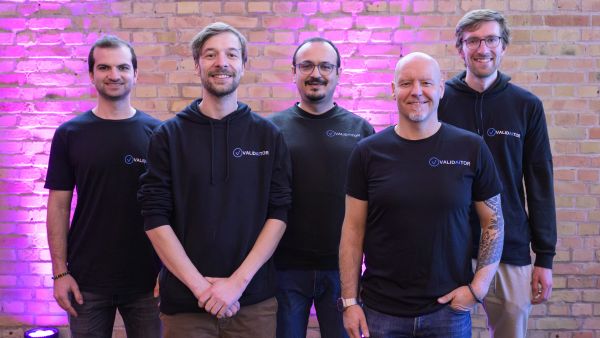
New EU laws now require risk management and compliance with ethical standards when using artificial intelligence (AI) is used. Validaitor, a start-up company spun off from the Karlsruhe Institute of Technology (KIT), assists organizations and businesses in implementing the rules. KIT has now decided to take a stake in the company.
"Artificial intelligence is developing dynamically worldwide, with big great opportunities but also risks," said Professor Thomas Hirth, KIT's Vice President for Transfer and International Affairs. "To put AI to use in a safe and responsible way, innovative approaches to quality assurance and compliance are needed, like those we work on at KIT, and like those that our spin-off Validaitor spin-off is now bringing to market. We''re proud to provide further support for this transfer."
KIT's investment is part of a successful round of financingfunding round. Other investors include Bitdefender, Voyager Ventures, EnBW New Ventures and the Start-up BW seed fund from MBG Mittelständische Beteiligungsgesellschaft Baden-Württemberg. "These investments will enable us to make further improvements improve to our platform and make AI more trustworthy," said Validaitor's founder and CEO, Yunus Bulut, founder and CEO of Validaitor. "We help our customers to cut reduce the cost of AI certification costs by up to 80 percent in comparison compared with to current standards." The new consortium of investors pools complementary expertise in strategically relevant sectors, with Bitdefender providing in-depth cybersecurity expertise while and EnBW New Ventures contributinges its knowledge about of the energy sector and critical infrastructure. KIT brings its research experience and its start-up incubator, the KIT Founders Forge, to the consortium.
Certifying AI Products
Validaitor offers a unique platform with solutions for AI governance, risk management and automated testing. In contrast to those of Unlike other providers, Validaitor's services combine testing tools and implementation tools, simplifying compliancet operation for organizations confronted with facing complex regulatory frameworks such as EU standards or the EU's AI Act. Validaitor verifies the implementation of these requirements and facilitates the strategic control of AI the use of AI; this includes enforcing ethical standards and transparency, and managing risks in AI applications. Validaitor's services also include red-teaming, where attacks are simulated to identify system vulnerabilities (as in cybersecurity penetration testing). Also part of Validaitor's service is so-called red-teaming, in which attacks are simulated in order to identify system vulnerabilities (as in cybersecurity penetration tests).

Gert Paczynski and Sebastian Krauß. (Photo: Robert Fuge, KIT)
Being "The Research University in the Helmholtz Association", KIT creates and imparts knowledge for the society and the environment. It is the objective to make significant contributions to the global challenges in the fields of energy, mobility, and information. For this, about 10,000 employees cooperate in a broad range of disciplines in natural sciences, engineering sciences, economics, and the humanities and social sciences. KIT prepares its 22,800 students for responsible tasks in society, industry, and science by offering research-based study programs. Innovation efforts at KIT build a bridge between important scientific findings and their application for the benefit of society, economic prosperity, and the preservation of our natural basis of life. KIT is one of the German universities of excellence.






